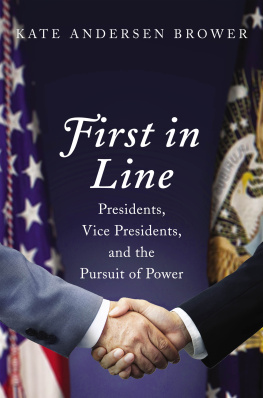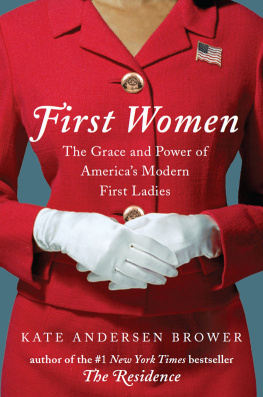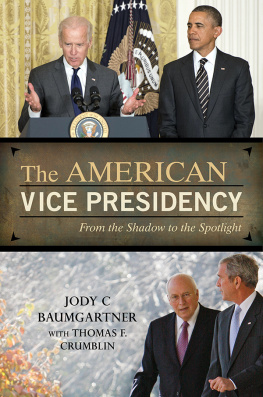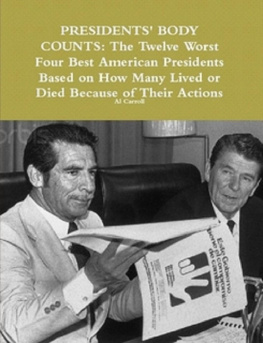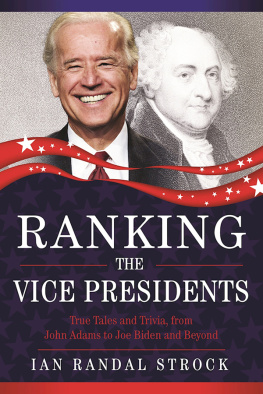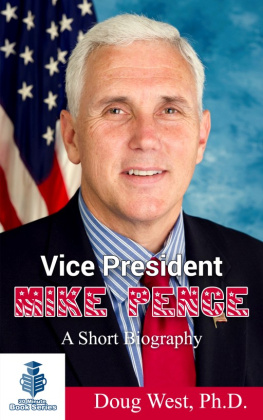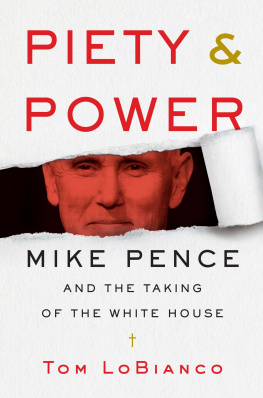Walter Mondale, George H. W. Bush, Dan Quayle, Al Gore,
I do not propose to be buried until I am really dead and in my coffin.
MASSACHUSETTS SENATOR DANIEL WEBSTERS REPLY WHEN OFFERED THE RUNNING-MATE SPOT ON THE WHIG PARTY TICKET IN 1848
I would a great deal rather be anything, say professor of history, than Vice-President.
THEODORE ROOSEVELT, VICE PRESIDENT UNDER PRESIDENT WILLIAM MCKINLEY
Once there were two brothers: one ran away to sea, the other was elected vice president. Nothing was ever heard from either of them again.
THOMAS R. MARSHALL, VICE PRESIDENT UNDER PRESIDENT WOODROW WILSON
The vice presidency is not worth a bucket of warm piss [later cleaned up to warm spit].
JOHN NANCE GARNER, VICE PRESIDENT UNDER PRESIDENT FRANKLIN D. ROOSEVELT
The vice presidency is that rare opportunity in politics for a man to move from a potential unknown to an actual unknown.
SPIRO AGNEW, VICE PRESIDENT UNDER PRESIDENT RICHARD NIXON
Dick, I dont know how you ever took the job.
GERALD FORD, WHO SPENT LESS THAN A YEAR AS RICHARD NIXONS VICE PRESIDENT, TO DICK CHENEY, VICE PRESIDENT UNDER PRESIDENT GEORGE W. BUSH
You die, I fly.
GEORGE H. W. BUSH, VICE PRESIDENT UNDER PRESIDENT RONALD REAGAN, ON VICE PRESIDENTS BEING DISPATCHED AROUND THE WORLD TO ATTEND DIGNITARIES FUNERALS
Let me make this pledge to you right here and now: For every American who is trying to do the right thing, for all those people in government who are honoring their pledge to uphold the law and respect our Constitution, no longer will the eight most dreaded words in the English language be: The vice presidents office is on the phone.
JOE BIDEN, VICE PRESIDENT UNDER PRESIDENT BARACK OBAMA, LAMPOONING HIS PREDECESSOR, DICK CHENEY
Iron sharpens iron.
MIKE PENCE, VICE PRESIDENT UNDER PRESIDENT DONALD TRUMP, QUOTING FROM HIS FAVORITE BIBLE VERSE, PROVERBS 27:17: AS IRON SHARPENS IRON, SO ONE MAN SHARPENS ANOTHER.
Sue, did the president call?
No.
SELINA MEYER, FICTIONAL ONETIME VICE PRESIDENT ON HBOS VEEP, TO HER BELEAGUERED SECRETARY, SUE
They felt called to do this. They knew what they were getting into, they knew the history, they knew the challenges, and they accepted that as part of their calling.
JIM ATTERHOLT, MIKE PENCES GUBERNATORIAL CHIEF OF STAFF, ON MIKE AND KAREN PENCES DECISION TO JOIN DONALD TRUMPS TICKET
T he Trumps were hunkered down at their golf club in Bedminster, New Jersey, in the summer of 2016. It was the final meeting in a series of discussions to decide on Donald Trumps running mate, and, as always, it was a family affair. Some combination of Trumps eldest childrenDonald Jr., Eric, Ivankaand Ivankas husband, Jared Kushner, had been mainstays at meetings with Washington lawyers in charge of vetting vice presidential candidates. But at this final decisive meeting it was Melania Trump, the aloof former model married to the outspoken and impulsive real estate tycoon, who drew the bottom line. Whoever is chosen must be clean, she insisted. That meant no affairs and no messy financial entanglements. In short, it meant no drama. She realized that her husband had a surplus of that already.
Melania was an important voice in the room during that last critical meeting, even though she was conspicuously absent when her husband actually announced Indiana governor Mike Pence as his running mate. It was the first time in modern campaign history that the wife of a presidential candidate was not at the public announcement, and it was an early indication of how uncomfortable she would be as first lady. It was decided at that final meeting that what they needed was someone with safe hands, as vetting lawyers call it. Someone who would be calm in a crisis; someone who could instill a sense of confidence in the Republican base that remained deeply skeptical of Trump. Most of all, what they needed was someone who could take over the presidency, if necessary.
Melania was keenly aware of the need to balance her husband, who has spent much of his public lifeand most of his life was lived clinging to the spotlightawash in scandal. She wanted to make sure that there were absolutely no skeletons in his running mates closet. But one finalist had a closet full of them (still, Donald Jr. backed him until the end), and another contender was so controversial that he would be ousted within the first few weeks of the administration when he served in a different position. Melanias shrewd instincts proved correct; Mike Pence was by far the least controversial on Trumps list of vice presidential candidates, and Pence could help Trump win over conservative Republicans. Melania is described by people who know her as stubborn and unapologetic about who she is. No one speaks for me, Melania once said when her husband promised a TV news anchor that she would do her show. In this case, she was decidedly in Pences corner.
Trump came late to the search for a running mate and did not reach out to Arthur B. Culvahouse, the well-connected Republican lawyer who led the vetting for John McCain in 2008, until late May. Trumps campaign chair, Paul Manafort, even considered paying a law firm to do the vetting, seemingly unaware of the long-held tradition of lawyers in Washington and New York clamoring to do it for free. Lawyers put together detailed reports on each of the candidates, including their tax returns and any history of psychiatric treatment, and they dig into rumors of affairs. In that secretive vetting ritual, Culvahouse makes a point of only using lawyers from his own Washington firm to guard against leaks. Kushner, the then-thirty-five-year-old real estate scion married to Ivanka, teased Culvahouse that one of his write-ups on a candidate read like a legal treatise, and another like the script for House of Cards.
Trumps options were limited. Trump was hard to get your mind around if youre vetting vice presidential candidates because he had made a number of provocative statements that would be potentially disqualifying in a conventional vice presidential nominee, said Culvahouse, who was White House counsel to Ronald Reagan and contributed to Jeb Bushs and Marco Rubios 2016 campaigns. A couple of Trumps picks, including Republican senator Bob Corker of Tennessee, took themselves out of the running, not because of personal entanglements, but because of moral objectionsthey felt they could not defend Trump every day, which is a key element of the vice presidency. The two finalists who would be one heartbeat away from the presidency could not have been more different, both in temperament and reputation.

